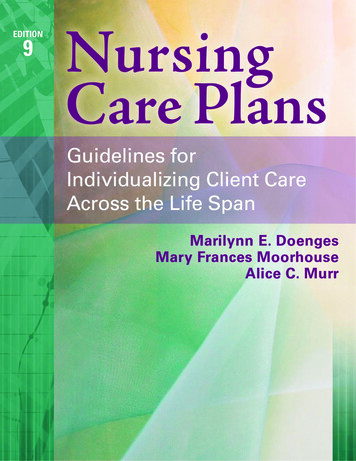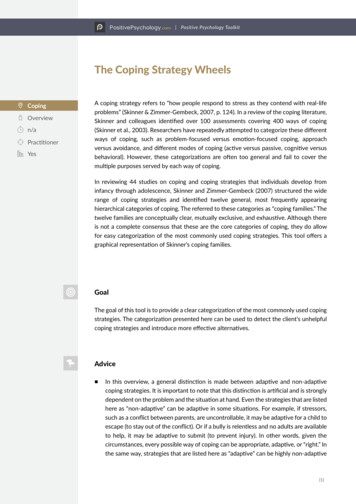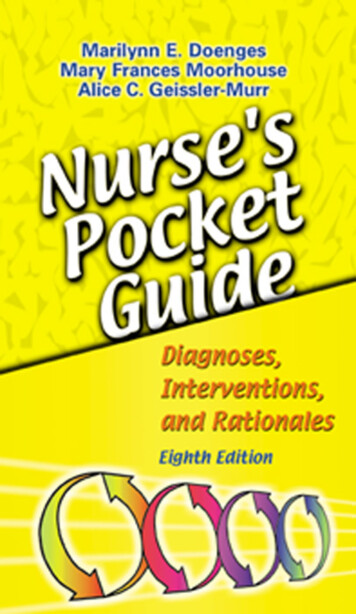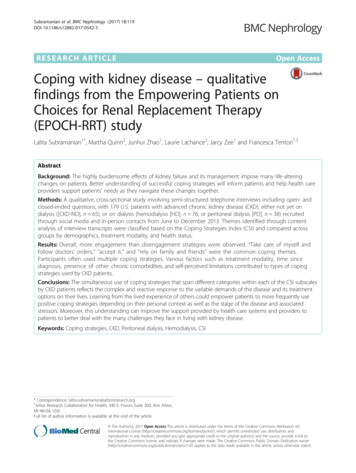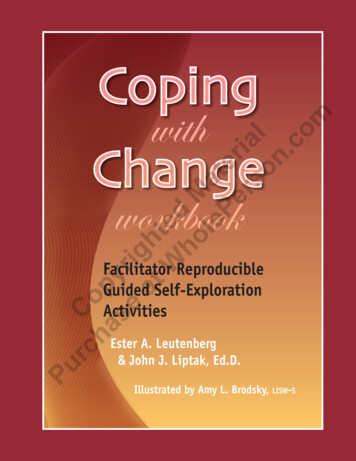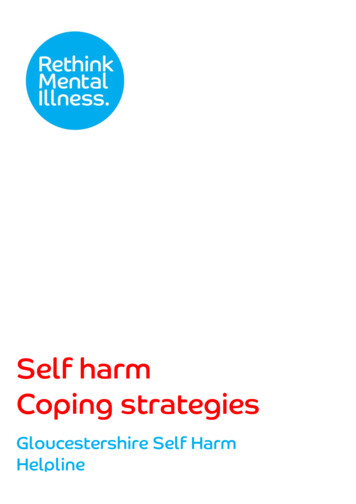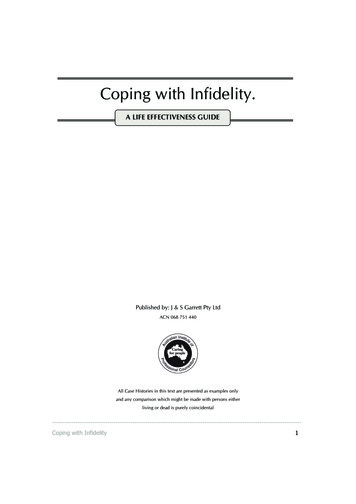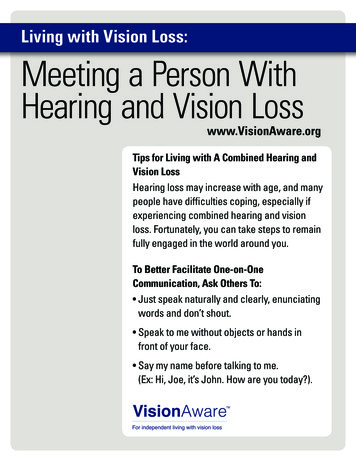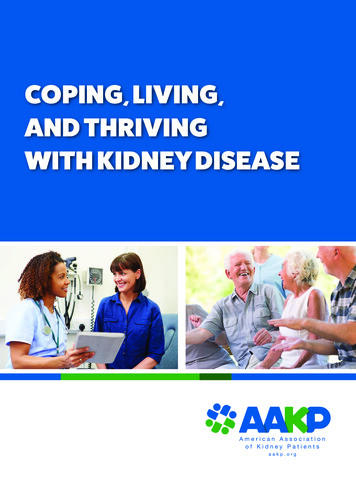
Transcription
UnderstandingCOPING,LIVING,YourAND THRIVINGHemodialysisWITHKIDNEYDISEASEAccess Options
COPING, LIVING, AND THRIVINGWITH KIDNEY DISEASETABLE OF CONTENTSSOCIAL SUPPORT -- BUILDING YOUR TEAM. 4ACTIVITY. 6ACKNOWLEDGE. 7TALKING POINTS FOR YOUR TEAM. 8, 11, 13ACTIVITY. 9, 14ADDRESS. 15ACTIVITY. 16, 19TALKING POINTS FOR YOUR TEAM. 17, 20RE-ASSESS. 21ACTIVITY. 22RE-PROGRAM. 23ACTIVITY.22, 25, 26, 27, 28TALKING POINTS FOR YOUR TEAM. 24CONCLUSION. 23ACKNOWLEDGEMENTS. 23
COPING, LIVING, AND THRIVINGWITH KIDNEY DISEASEWHAT IS KIDNEY DISEASE?When someone has chronic kidneydisease (CKD), their kidney functionhas slowed down. There are a varietyof diseases or conditions that can leadto kidney disease. There are five stagesof CKD. In Stage 1 there is little damageand by Stage 5 the kidneys have lostmost of their function and there’s aneed for renal replacement therapy,such as dialysis or a kidney transplantto help take the place of your nonworking kidneys. Changes in kidneyfunction usually takes place over time.However, being diagnosed withkidney disease, at any stage, can bechallenging. Being diagnosed withkidney disease can leave you feelingoverwhelmed and with more questionsthan answers. There are a lot ofemotions and actions to think through.And many times, patients are alsotrying to juggle other responsibilities(such as family or work, or otherchronic conditions such as diabetes,hypertension, heart disease, etc.) at thesame time.The Purpose of this Booklet is toempower individuals to take chargeof their disease management byconfronting negative feelings andproviding strategies on how you andyour team can thrive and become thewarrior you want to be on this journeyof kidney disease.The booklet has been organized toassist patients with the followingphases:ACKNOWLEDGE: Begin thejourney of accepting your diagnosis.Identify who is a part of your socialsupport team. Recognize any negativefeelings you may be having, so youand your team can overcome thesenegative feelings and build a morepositive response.ADDRESS: Identify short-termand long-term goals to begin problemsolving.RE-ASSESS: Determine what roleeach member of your team can have inhelping you take charge of your health.RE-PROGRAM: Revise yourthinking and approach to your kidneyhealth.1American Association of Kidney Patients: Coping, Living, and Thriving with Kidney Disease
SOCIAL SUPPORTSocial support is crucial for everyphase listed above. Having strongsocial support will help you learn toacknowledge, address, re-assess, andre-program your thoughts, attitude,and actions in taking charge of yourkidney health.A social support team is a networkof people that you get informationthrough and share informationwith. Social support can come inmany different forms – from family,friends, colleagues, neighbors, andany other networks you may belongto (e.g., clubs, community groups,and religious organizations) as wellas health care providers.You might not find it easy to discussyour situation with people, to askfor help, or to depend on others.However, try to put yourself in theirposition, and think about how youwould want to help your friend orcolleague if they were experiencinga chronic illness. You may besurprised at people’s kindness,generosity, and understanding.You might prefer to speak to a fewselected individuals privately, or itmight be easier to have a trustedfriend or family member share yourstatus on your behalf. There is noright or wrong choice, as long asyou have people in your corner toprovide the support you need. Themore support you have, the betterchances you have of good outcomesfor your physical and emotionalhealth.Your team can support you throughthis journey. Your team can helpimprove your knowledge of kidneydisease and guide you throughdecisions that need to be made.Growth is when youchoose to address certainbattles, stand still in themist of the storm, andremain vigilant whenyou feel all hope is gone.Throughout this booklet you will findstatements in yellow boxes, like thisone. These are ‘statements of affirmation.’ Try saying them to yourself oraloud, so that these words can belong toyou and help you along your journey.Individuals from different groupscan form your team. These groupscould be friends, family, health carestaff, and people in the community.It may feel like you don’t haveanyone in one or more of theseAmerican Association of Kidney Patients: Coping, Living, and Thriving with Kidney Disease2
groups that is on your team. Takesome time to think about eachof these groups – there might besomeone in that group after all. Anddon’t be afraid to search out newpeople to be a part of your team.A friend can be anyone you feelcomfortable to share your upsand downs with. A friend can besomeone you have known foryears and been through many lifetransitions with, or a person youmay have just met but you feelconnected to, someone who you feellike truly listens to you. Your friendsjust want to support you in your upsand downs; help them by sharingyour journey.Family can be related, or not. Thiscan be your brother, sister, aunt,cousin, or someone very close thatmay not be related, but you considerthem your family. There is a mutualcare and love between you and yourfamily members; you would sacrificefor them, and the feeling is mutual.Share with your family member, andallow them to support you being thewarrior they know you are.3Health care staff can be a varietyof healthcare professionals. Theycould be your kidney doctor,the pharmacist that fills yourmonthly prescriptions, or a nurseor technician at your dialysis unit.Don’t hesitate to ask them questions.You may be surprised at howmuch they know and how muchknowledge they are willing to share.If the staff member doesn’t seemthat knowledgeable about kidneydisease, teach them what you knowand bring them on this journey withyou!Community members are peopleyou share something in commonwith, like living in the sameneighborhood, working in the samebuilding, or liking the same hobby.Community members could be workcolleagues, members of your church,persons at your weekly card games,people you frequently see at yourlocal American Legion, or peopleyou see at your monthly book club.You are already sharing a part ofa similar journey and have somethings in common; continue sharingyour journey with them!American Association of Kidney Patients: Coping, Living, and Thriving with Kidney Disease
ACTIVITY:Who is on your team? Team members are those who can provide socialsupport as well as practical support. Your team can come in manydifferent shapes, sizes, and walks of life: lifelong friends, a helpfulneighbor, a work colleague, or a nurse at your clinic. Take a few minutesto identify a few people in each of these groups that are on your team.FRIENDSFAMILYHEALTH CARECOMMUNITYAmerican Association of Kidney Patients: Coping, Living, and Thriving with Kidney Disease4
ACKNOWLEDGEAcknowledge: Begin acceptingyour diagnosis and recognize anynegative feelings you may be havingso you and your team can overcomethese negative feelings and beginbuilding a more positive response.Remember, it’s normal to experiencea variety of emotions as you learnmore about your kidney diseasediagnosis.You have a choice betweenengaging your social supportteam (as discussed) or exhibitingsocial withdrawal. We know thatsocial support is essential tomany situations in life, includingnavigating a chronic healthcondition. It may be difficult atfirst to learn to rely on peoplerather than going it alone or toopen up about the challengesyou’re facing. With the help ofsocial support, you are likely tohave more success and an easierexperience learning to acceptyour diagnosis and not lettingyour life be defined by yourkidney disease.It can almost be too easy to feelalone and isolated when you geta diagnosis like kidney failure.Fortunately, you are not alone.Many people have been diagnosedwith kidney disease or kidney failureor a similar chronic condition, andmany more know someone closeto them who has. Don’t be afraidto share your story. You may besurprised to hear similar experiencesas yours, how willing others are tosupport you on your journey, andmight even learn someone close toyou also has kidney disease and youdidn’t even know.MORE THAN 1 IN 7Social Withdrawal can be caused15% of U.S. adults are estimated tohave chronic kidney disease, thatis about 30 million people. (source:Centers for Disease Control andPrevention – CKD Initiative)by blaming or criticizing yourselffor the situation or refusing to seeksupport from others when needed.Withdrawing can mean hiding theproblem, not telling other peoplewhat you are experiencing, orthinking or feeling like you’re “on anisland” or don’t have hope.Thomas, age 47: “No one knew whatI was going through. No one I knewhad kidney disease, how could theyeven begin to understand what Iwas going through. Then one dayI mentioned going to a vascularsurgeon for a PD-access evaluation5American Association of Kidney Patients: Coping, Living, and Thriving with Kidney Disease
to a golfing buddy. Turns out, his unclehad kidney failure and his dad gave theuncle a kidney! My buddy knew exactlywhat I was talking about. It felt good tobe understood and listened too. Kidneydisease really does effect more peoplethan you would ever know because noone talks about it!”TALKING POINTS FOR YOUR TEAMFRIENDSFAMILYHave your friends keep engagingyou in their activities and keepasking you to hang out. You maynot feel like doing anything rightaway, but tell them you still wantto be involved and will join thegroup when you can.It will be helpful for others toknow what is going on, butyou may not have the energyto tell everyone yourself. Ask atrusted family member to tellothers about your kidney diseasediagnosis. They may also startforming a strong support networkthat is there, whenever you areready.HEALTH CARECOMMUNITYThe diagnosis of kidney diseasecan feel isolating. Ask thehealthcare staff if they know of asupport group, either in-personor online. Visit www.aakp.org/supportgroups to see if there’sa support group in your localcommunity. If not, AAKP hasresources to help you take chargeand start one.If you don’t want to ask for helpyourself, a trusted colleague orfellow community member mightbe willing to seek help on yourbehalf. Do you ever think badlyif someone posts a message ormakes an announcement, seekingto support someone in a difficultsituation? Of course not! It canalso be done discreetly.American Association of Kidney Patients: Coping, Living, and Thriving with Kidney Disease6
ACTIVITY:Many people find it easier to say something in writing and from adistance so they can collect their thoughts, rather than in person or onthe phone. It takes the pressure off, and you won’t have to worry abouthow they respond to you in real time. Compose a written note, text, oremail to a ‘team member’ you already identified in each of the followingcategories: friends, family, health care staff, and community members. Inthe note, practice what you will asy to each of these significant personsto obtain help/support in dealing with your journey. For health care staff,make a list of questions, concerns, or anything you feel you may forget todiscuss at an appointment. Next, send the notes!You have a choice between wishful thinking and expressing youremotions. Wishful thinking might be tempting. It is hard to admit thatlife is different than what we expected, and it is natural to want to holdon tightly to what you used to believe or know. However, it is importantto learn how to honestly recognize and express your emotions aroundkidney disease.Example of a text to a friend:Went to the doctor today and learned that my kidneysaren’t functioning like they should. My doctor is reallyhelpful but says I need to change my diet. Can you helpme find new recipes?Example of a written note to a community member:Thank you for all your thoughts and prayers. I’ve beengoing through some health issues and appreciate theextra support. I am not ready to talk about it, just yet,but I am glad to know you are there when I am ready.Thank you.7American Association of Kidney Patients: Coping, Living, and Thriving with Kidney Disease
Wishful Thinking is about believingor making decisions based on whatyou want to happen, not the realityof the situation. People who thinkwishfully may be having a hard timeaccepting the situation or reframingit so that it is manageable. Somepeople diagnosed with kidney failurewill ‘hope things will get better’ andmay not fully understand what ishappening to their health.Wishful thinking might not beharmful in the short term. For manypeople, wishful thinking may helpyou overcome the initial shock ofthe diagnosis. However, it is not apermanent solution. Sticking withthis way of thinking could causeyou to lose sight of what is trulyimportant in your life and couldcreate larger health problems bydelaying decisions and treatment.Melissa, age 65: “I was in disbeliefwhen the doctor said my kidneyswere failing. I told him I would eatmore salads and less red meat to helpimprove my kidney function. I didn’treally listen to him when he said thatmy kidney function wasn’t comingback or maybe I thought I’d be thatmiracle person in which it would. Itwasn’t until my pastor told me hismom died of kidney disease becauseshe kept thinking it would come backand didn’t take the necessary steps tounderstand, learn and take controlof her disease that shocked me intofacing this problem.”American Association of Kidney Patients: Coping, Living, and Thriving with Kidney Disease8
TALKING POINTS FOR YOUR TEAMFRIENDSFAMILYHave your friends sit withyou and figure out what yourpriorities in life are. Then haveyour friends help you figure outwhat questions you need to askor things you need to do to makesure you achieve those goals andmaintain your quality of life.Your family can help you facereality and the full weight of akidney disease diagnosis. Ask afamily member to go with youto each doctor visit so they canhear the information and helpyou remember what is happeningand what you should be focusingon. Remember, kidney diseasecan impact the entire family andthere may also be questions froma caregiver’s perspective thatyour family may want to knowand you may not have thought of.HEALTH CAREListen when the doctor tells youabout your health and how yourkidney function is changing.Take what they are sayingseriously. If they tell you to makea follow-up appointment, or geta consultation for a surgery, orcomplete specific screenings, dowhat they say and don’t wastetime – because life is too precious.Be prepared to ask the rightquestions. AAKP’s Pocket Guideto Managing Kidney Diseaseis a convenient brochure thatprovides suggested questions toask your doctor at every stageof kidney disease, to help keepyou on track and guide theconversation.9COMMUNITYConnect with other peoplewho are dealing with a chroniccondition – it doesn’t have tobe kidney disease. Learn whatchallenges they had to overcomeand how they overcame thosechallenges. Learn from otherpeople’s experiences. You maybe surprised how similar thejourneys can be.American Association of Kidney Patients: Coping, Living, and Thriving with Kidney Disease
Expressing Emotion is when yourelease and communicate yourfeelings. Some people choose touse humor to cope or share theiremotions when grieving a diagnosis.If you are feeling scared aboutyour kidney disease diagnosis,figure out what about it is scary orworrying you the most, and talk withsomeone in your social support teamincluding your health care teamto overcome this fear. Others maybecome frustrated or very sad tryingto decide how this diagnosis can orwill impact their life. It is importantto rely on your health care teamand other individuals close to youto acknowledge your feelings andlearn to move beyond them. Thisis very important so that you canfocus on what’s really important:understanding and managingyour condition, choosing the righttreatment option for you, andmaintaining your quality of life.It is important to be honest withyourself and your feelings, whilealso not allowing them to controlyour life. Social support is criticalI will pursemy journey inspite of fear.here. Rather than keeping yourfeelings to yourself, it is importantto find an outlet for your feelingsso that you are not overwhelmedby them. Many people find comfortin talking to trusted friends, familymembers, neighbors, coworkers,or other significant people in theircommunities. Sometimes you mayneed an activity as an outlet, suchas taking a walk, sewing, golfing,painting, etc.Darren, age 34: “The process togetting a kidney transplant was noteasy for me and involved a lot ofwaiting and anxiety. I like to crackjokes when I am in the waiting roomto help ease the stress and pass thetime. I also talk with my sister aboutmy high and low emotions in theprocess. She helps me focus on thepositive.”American Association of Kidney Patients: Coping, Living, and Thriving with Kidney Disease10
TALKING POINTS FOR YOUR TEAMFRIENDSFAMILYIt is ok if you feel overwhelmedand out of control. Tell yourfriends this and ask them to bepatient with you. They care aboutyou and won’t be angry with you,and may even offer their help.Be mad. Be frustrated and scared.Be overwhelmed. And tell yourfamily about these feelings. Don’thide your feelings from the oneswho care about you. They willhelp you through these emotionsand begin problem solving andre-programming to ensure youwill thrive on this new journey.HEALTH CARECOMMUNITYDon’t hide your feelings fromhealth care staff. They may beable to identify tips or resourcesto help you through the negativefeelings and begin taking chargeof your kidney health. Like yourfamily, your health care teamwants the best for you and wantsto see you continue to live yourbest life despite kidney disease.11Connect with other peoplewho are dealing with a chroniccondition – it doesn’t have tobe kidney disease. Learn whatchallenges they had to overcomeand how they overcame thosechallenges. Learn from otherpeople’s experiences. You maybe surprised how similar thejourneys can be.American Association of Kidney Patients: Coping, Living, and Thriving with Kidney Disease
ACTIVITY:Journaling - get out your thoughts and emotions either on paper or on acomputer/device. Don’t worry about making it coherent – just write/typewhatever you are thinking and feeling in the moment. Often, you mightnot realize what you are feeling until you try to put it into words. Manypeople find journaling to be useful. It can make you feel better to ‘empty’your minds. It could also help you gain perspective.American Association of Kidney Patients: Coping, Living, and Thriving with Kidney Disease12
ADDRESSAddress: Identify short-term andlong-term goals to begin problemsolvingYou have a choice between (A)avoiding the problems of yourCKD diagnosis or (B) trying tosolve the problems of your CKDdiagnosis. Problem avoidanceis similar to wishful thinking –you are not really admitting thetruth of the situation and whatneeds to happen. When you areproblem solving, you are activelyworking to figure things out.Social support is vital during thisprocess.appointments that your doctor isrecommending. Start meeting withthe other health care professionalsyour doctor is recommending.Even if you don’t completely thinkyou need to. Better to meet witheveryone and gather informationsooner, than needing it later and nothaving time to gather it.Problem Avoidance is denyingthe situation and avoiding thoughtsor actions related to the condition.Some people have a hard timeacknowledging the reality of kidneyfailure; you may view kidney failureas temporary or not serious. And soyou may feel like shrugging off theneed for positive coping strategiesor lifestyle changes because ‘no realproblem exists’.Time is precious. If your doctor isalready talking to you about kidneyfailure and discussing either dialysisor a kidney transplant, then thereis literally no time to waste. Nowis the time to ‘put one foot in frontof the other’ and start making the13Gary, age 69: “I kept telling my doctor‘I feel fine. I don’t need to thinkabout dialysis because I feel fine, mykidneys are fine,’ and then I woundup in the ER with a tube in my neckon emergency dialysis after I passedout at my son’s house. Avoiding theproblem only made it worse. I shouldhave listened to my doctor and talkedwith my family about all of this beforeI was on the floor and them having tocall 911.”American Association of Kidney Patients: Coping, Living, and Thriving with Kidney Disease
TALKING POINTS FOR YOUR TEAMFRIENDSFAMILYGet your friends to help youunderstand how your health ischanging. Have your friends helpexplore online resources (listedbelow) that can communicatewhat a diagnosis of kidneydisease means to you and yourlifestyle.Have your family hold youaccountable and show you ‘toughlove’. Give your family a detailedreport each time you visit yourdoctor so it helps you rememberand your family understand whatis happening and the changestaking place. This is importantif you have any dietary changesyou need to abide by. Allowingyour family to know what thoseare and how they can help, willultimately make things easieron you when at family dinners,parties and events.HEALTH CARETell your doctor that you needthem to hold you accountable tokeep appointments and followtheir advice. But show the healthcare staff that you care as muchabout your health as they do –keep your appointments, takenotes, and try and follow theiradvice.COMMUNITYUnderstand that your peers andcommunity care about you. Whenyou are ready to talk, they will bethere to listen and support you.They will help you find ways tostay involved with your regularactivities and hobbies.American Association of Kidney Patients: Coping, Living, and Thriving with Kidney Disease14
ACTIVITY:Pick three of the following resources to investigate, explore, and/or participate in. Spend time learning about your condition and alsointeracting with other people who have experience in this area, and whomay be able to provide support, advice, and guidance. Share them withyour team and have them get more informed too!Resource List: American Association of Kidney Patients: www.aakp.orgRenal Support Network: www.rsnhope.orgNational Kidney Foundation: www.kidney.orgAmerican Kidney Fund: www.kidneyfund.orgThe iChoose Kidney risk calculator: A tool that educates patientsabout the risk of available treatment options for kidney disease.www.ichoosekidney.emory.edu 15My Dialysis Choice: A tool that helps individuals with kidney disease choosethe right treatment option for them. www.mydialysischoice.orgAmerican Association of Kidney Patients: Coping, Living, and Thriving with Kidney Disease
Problem Solving is about formingand acting on strategies to reducetheir stress by changing the stressfulsituation. The strategies mightinvolve changing your behavior orhow you think about the situation.Problem solving involves beingproactive with your health, followingthe advice of medical providers,asking questions when you don’tunderstand or are concerned aboutwhat you are hearing, preventingpotential setbacks from occurring,and making health decisions in atimely manner.Leticia, age 42: “Since I got diagnosedwith kidney disease, my diet haschanged, and I am taking pills I neverheard of. But I listen to my doctor andI work closely with the pharmacistto make sure I understand what I’mtaking, why I’m taking it and amfollowing ‘doctor’s orders’ as best asI can. If I have a question or don’tunderstand something, I ask andmake sure I write down the answersso I can remember.”Some people find it helpful to makelists to help remember key stepsto take and questions to ask. Manytry to plan ahead to avoid possiblechallenges in the future. Whileothers might look for as muchinformation as possible, to becomeeducated on their condition andtheir options.American Association of Kidney Patients: Coping, Living, and Thriving with Kidney Disease16
TALKING POINTS FOR YOUR TEAMFRIENDSFAMILYPlan a ‘kidney friendly’ potluck!Get recipe recommendationsfrom your nephrology dietitianor through online resources(www.aakp.org/recipes) andsend them to your friends. Haveeach friend pick a different recipeand then get together to share ina tasty meal!Engage a family member to helpyou make a list of questions youneed to ask at your next doctor’sappointment, or maybe of thingsyou can buy (such as a weekly pillbox) to help get and keep thingsorganized.HEALTH CAREWork with your kidney doctorand nurse to identify who is onyour health care team and therole each person plays, so youknow who to go to for specificquestions.17COMMUNITY“I need to talk with my boss andcoworkers about my diagnosis.but I need to let them knowmy work schedule may change.”I don’t need to tell themevery detail, but I need tolet them know my workschedule may change.Visit www.kidneyworks.orgfor more employment resources.American Association of Kidney Patients: Coping, Living, and Thriving with Kidney Disease
ACTIVITY:What challenges are you facing or questions do you have, right now?Are you trying to find new recipes that are more ‘kidney healthy’? Tryingto manage changes in your medication schedule? Or trying to determinewhich type of treatment option is best for you? List 4 to 6 challenges orquestions that are weighing on you.American Association of Kidney Patients: Coping, Living, and Thriving with Kidney Disease18
RE-ASSESSRe-Assess: You’ve acknowledgedyour current situation and havebegun thinking about how to answerspecific questions and overcomechallenges. You have also identifiedkey members of your team that canhelp you on this journey. Let’s getgoing! This section will help youfigure out how each member of yourteam can help you take charge ofyour health.Problem Solving with SocialSupport: Problem solving can feeloverwhelming at times. Sometimes itcan be hard to decide which questionto tackle first, especially when onequestion seems to lead to morequestions. But you are not answeringthese questions all by yourself. Oneperson can’t know everything abouteverything!19You have your social support teamwith you. Your team can help youanswer these questions. They areready to help you navigate yourbiggest challenges; they may offer adifferent perspective that can leadto an even better answer than if youtried to do this by yourself.Bruce, age 55: “I met a few otherpatients at the clinic I go to fordialysis and we decided we would gettogether once a month for lunch. Wetalk about everything. We talk aboutour friends, our kids and grandkids,everyday problems, and our kidneyhealth. We talk about how we aremanaging our kidney disease and,together as a group, we brainstormabout facing any hurdles one of usmight be facing.”Every actionbegins witha thought.Positive thoughtsencouragepositive actions,and positiveactions manifestpositive outcomes.American Association of Kidney Patients: Coping, Living, and Thriving with Kidney Disease
ACTIVITY, PART A:Get your team involved! In the previous activity, you listed 4-6 questionsor challenges you are facing, right now. How can your team help comeup with answers or solutions? Think about each of your team members what task or question can each team member help you with? When andwhere can you talk to them about it?FRIENDSFAMILYHEALTH CARECOMMUNITYACTIVITY, PART B:For each question or challenge you have listed above, now list one ortwo specific actions that you and your team can work on together. Thiscan include medical actions, social actions, behavior changes, and work/community actions. It would be useful to identify people that can helpyou in each of these actions.FRIENDSFAMILYHEALTH CARECOMMUNITYAmerican Association of Kidney Patients: Coping, Living, and Thriving with Kidney Disease20
RE-PROGRAMRe-Program: Revise your thinkingand approach to your kidney health.You are on this journey, but you arenot alone. You have a strong team ofpeople united to help you thrive!Cognitive RestructuringThis is a mental strategy whichmeans to re-program how you tacklea problem. It can help people copewith stressful situations by changingtheir outlook of a situation and findthe positive aspects. For example,you can use your diagnosis of kidneydisease to become more mindfulabout your overall health and life.Life is full of changes and challenges.It doesn’t help you mentally,emotionally or socially to dwell onthe negative. Instead, focus on whatyou can do that will positively impactyou, your health and your life. Youmay also find it helpful to accept the‘new normal’ while creating newhobbies and moving forward with aproductive life.Cognitive Restructuring is easierwith Social Support and when youExpress your EmotionsThroughout this
such as dialysis or a kidney transplant to help take the place of your non-working kidneys. Changes in kidney function usually takes place over time. However, being diagnosed with kidney disease, at any stage, can be challenging. Being diagnosed with kidney disease can leave you
